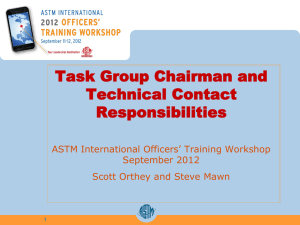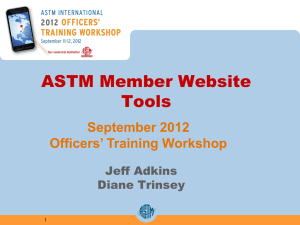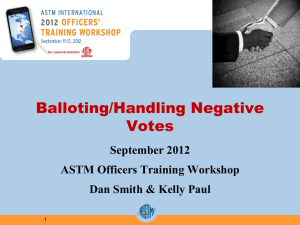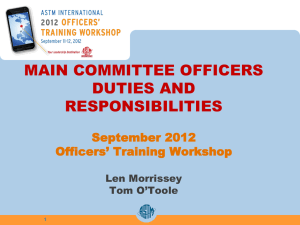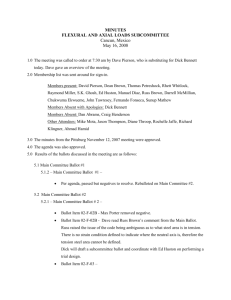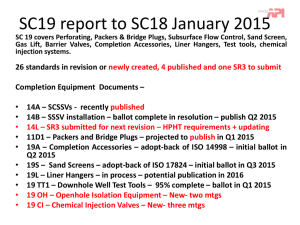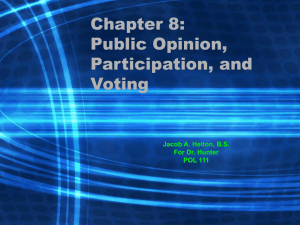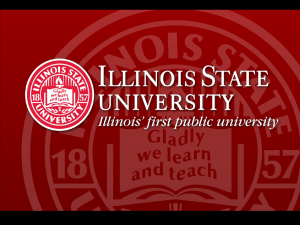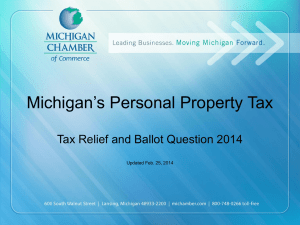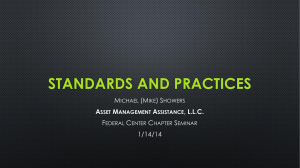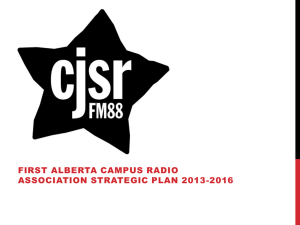Subcommittee Chairman`s Duties and Responsibilities
advertisement
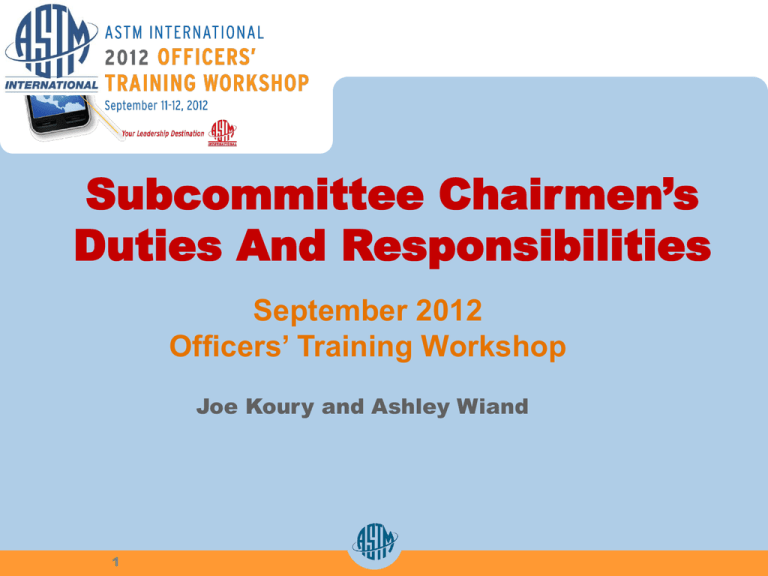
Subcommittee Chairmen’s Duties And Responsibilities September 2012 Officers’ Training Workshop Joe Koury and Ashley Wiand 1 OBJECTIVES At the end of this module, you will be able to serve effectively as a Subcommittee Chairman by: • Handling administrative responsibilities • Conducting an effective meeting • Preparing items for Sub and Main Committee ballots • Resolving negative votes effectively • Utilizing available resources at ASTM Headquarters 2 ROLE OF SUBCOMMITTEE CHAIRMAN You serve as a . . . Leader Communicator Administrator Organizer 3 DELEGATION OF RESPONSIBILITIES 4 THE VICE CHAIRMAN Chairs meetings in your absence Assigns projects to task group chairmen and follows up on deadlines Answers correspondence 5 THE SECRETARY Records minutes Collects task group reports Distributes attendance lists Assumes responsibilities as delegated by the Sub Chairman 6 SUBCOMMITTEE CHAIR ADMINISTRATIVE DUTIES 7 DUTIES Report to main committee on subcommittee actions Process necessary information through the website Provide meeting room requirements and audio/visual needs for next meeting Assist in inquiries on standards 8 INQUIRIES ON STANDARDS ASTM membership and staff are prohibited from offering official interpretation of standards Official responses must follow Section 16 of the ASTM Regulations Inquiries can be handled informally by Subchairs and technical contacts Be clear that the response is a personal opinion Do not use ASTM stationery for the response 9 ROSTER MAINTENANCE Approve new members with classification and vote Check balance and classifications of existing members ASTM sends email notifications regarding new members and out-of-balance rosters 10 11 12 CONDUCTING A MEETING 13 PREPARATION FOR A MEETING Review ballot results Review correspondence Review minutes and action items from previous meeting Review status of your subcommittee’s standards Update subcommittee roster/print attendance sheet Contact task group chairmen Contact staff manager 14 WHY IS AN AGENDA IMPORTANT? Prepares chairman Prepares attendees Creates an interest Defines clear objectives Serves as a valuable organizational tool 15 AN INFORMATION-FULL AGENDA INCLUDES: Meeting date, time, location Agenda/minutes approvals Agenda items with background/goals Unfinished/New business Utilize the Create My Agenda tool. 16 INCLUDE BALLOT RESULTS IN AGENDAS Access My Tools >> Ballot Negatives and Comments link Copy and paste negative comments into the meeting agenda Allows all subcommittee members to be aware of the negatives that need to be resolved 17 Create My Agenda 18 Create My Agenda 19 Create My Agenda 20 Inserting Negatives and Comments 21 Inserting Negatives and Comments 22 Inserting Negatives and Comments 23 Inserting Negatives and Comments 24 OPENING A MEETING Start on time Delegate the task of taking minutes if you don’t have a subcommittee secretary Review ASTM’s Antitrust Statement (included in agenda) Announce that recording of any kind (audio or video) is not allowed in ASTM meetings Review the agenda/obtain agreement on the meetings objectives and goals Revise agenda if necessary 25 DURING THE MEETING Use ASTM Regulations Use Robert’s Rules of Order Use time efficiently Use members effectively 26 PARLIAMENTARY PROCEDURE Majority rule must prevail Rights of members with minority opinion are protected Respect for all members assured Logical order of business provided 27 HOW TO MAKE A MOTION Motion made Motion seconded Chairman calls for discussion of the motion Chairman calls for vote on the motion 28 USES OF MOTIONS Motion Requires a Second Debatable Vote Needed Approve Agenda Yes Yes Majority Approve Minutes Yes Yes Majority Place an Item on Ballot Yes Yes Majority Establish a Task Group Yes Yes Majority Executive Administrative Decision Yes Yes Majority Adjourn a Meeting Yes Yes Majority Not Persuasive Action (must state rationale) Yes Yes 2/3 Affirmative Not related Action (must state rationale) (New agenda item for next meeting) Yes Yes 2/3 Affirmative Amend a motion Yes Yes Majority 29 ROLE OF THE CHAIRMAN Remain neutral Recognize attendees who wish to speak Maintain order 30 CLOSING A MEETING State conclusions reached Summarize assignments Review requirements for next meeting 31 AFTER THE MEETING Prepare Minutes - post through the My Tools portion Enter Negative Resolutions Make a list of subcommittee ballot items and main committee/concurrent ballot items and send to your staff manager Contact staff manager regarding any changes for the next meeting (time, room size, a/v, etc.) 32 33 34 35 36 PREPARING ITEMS FOR BALLOT 37 REGISTERING WORK ITEMS Required upon initiation of work on new standards or revision to existing standards No need for reapprovals, withdrawals or reinstatement An easy eight-step process 38 MONITOR WORK ITEMS Establish procedures for who will register work items within the subcommittee Review content and authorize the posting of the work item to the web Keep active work items current and delete dropped projects 39 WHY WORK ITEMS? Promote activity Provide visibility Serve as tracking number Initiate the “Standards Tracker” function 40 41 42 ISSUING A BALLOT Subcommittee Ballot: • Subcommittee Chairman or their designees are authorized to initiate a subcommittee ballot • Motion passed at a subcommittee meeting • Rationale required for each ballot item Concurrent Main/Sub Ballot: • Minor revisions to an existing standard or new standards/major revisions that have undergone at least one subcommittee ballot can be issued concurrently • Concurrent ballot can be issued when approved by the main committee chairman and either approved at a subcommittee meeting or requested by subcommittee chairman • Rationale required for each ballot item 43 PREPARING NEW DRAFTS FOR BALLOT Use the standard templates Use the Form and Style Guide for... • Proper format of Test Methods, Specifications, Classification, Practices, Guides, and Terminology “Up Front” editing available via Headquarters 44 PREPARING REVISIONS FOR BALLOT Register work item A link to the Word document will be provided to the technical contact A link to instructions on how to prepare the work item for ballot will also be provided Tack Changes “bars” appear in the margin of the document Submitting entire standard is not necessary, only revised sections 45 PREPARING RATIONALE FOR BALLOT Short, concise explanation for balloting the item Previous ballot history Changes made due to negative votes or comments Rationale required for all ballot items Include all contact information 46 RESOLVING NEGATIVE VOTES EFFECTIVELY Communication Consideration Documentation 47 COMMUNICATION Contact the negative voter: • before the ballot closes • before the meeting • after the meeting 48 CONSIDERATION Ensure proper motions are made when handling negative votes • Motion should include the rationale Tally only official voting members • Official vote is indicated on attendance sheets 49 DOCUMENTATION Document motions, vote count, and rationale in minutes Respond to negative voter Resolving the negative online 50 DISPOSITION OF NEGATIVE Persuasive Withdrawn Withdrawn with Editorial Change(s) Not Related Not Persuasive Previously Considered 51 UTILIZATION OF AVAILABLE RESOURCES 52 ASTM STAFF Staff Manager/ Administrative Assistant Member Services Corporate Communications Technical and Professional Training Editor Corporate Development Symposia Proficiency Testing Program Interlaboratory Study Program (ILS) 53 TOOLS AND RESOURCES Regulations Governing ASTM Technical Committees Form and Style Manual Committee Bylaws Virtual Classroom for Members Standard Templates 54 TOOLS AND RESOURCES 55 MORE TOOLS AND RESOURCES Standards Tracking Publicity (Standardization News/Press Releases) Regularly Scheduled Virtual Training Sessions 56 57 MORE TOOLS AND RESOURCES Virtual Meetings • Combination of web-based/teleconference meeting • Allows task groups to work on standards in between face-to-face meetings • Can create and revise standards online in real time • Schedule your own or contact Staff Manager 58 REVIEW OF SPECIFIC OBJECTIVES Handling administrative responsibilities Conducting an effective meeting Preparing items for Sub and Main Committee ballot Resolving negatives effectively Utilizing available ASTM resources 59 GOOD LUCK IN YOUR IMPORTANT ROLE Joe Koury: jkoury@astm.org Ashley Wiand: awiand@astm.org 60
